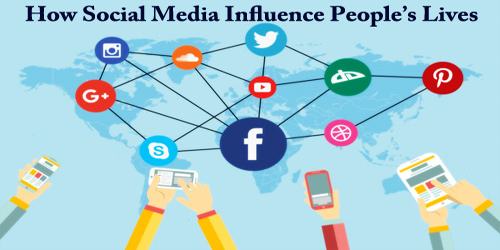Social Media has become part of our lives and at this point, we cannot even imagine the world without different social media channels. We are all aware of how important social media is for small, medium, and large businesses, thus here we will focus on individuals, and how social media affects our lives. Around 40% of the world’s population uses social media. Social Media has an impact on our every day to day life. We are all running a race that we aren’t aware of.
Social media use has skyrocketed over the past decade and a half. Growth in the number of people who use Facebook, Instagram, Twitter, and Snapchat and other social media platforms and the time spent on them has garnered interest and concern among policymakers, teachers, parents, and clinicians about social media’s impacts on our lives and psychological well-being.
It is challenging to imagine the modern world without the rapid development of science or access to the Web. Surfing online has become a common hobby and a popular way to communicate. Social media plays a significant role nowadays as people use it on a regular basis for numerous purposes. The use of this innovation, however, has led to several consequences. As people become constant users of social media and spend much time online, the web starts affecting their lifestyle and bringing noticeable changes to society, both beneficial and negative ones.
Introducing social media has affected the overall approach to communication. Nowadays, it is much easier to keep in touch with friends and relatives than ever. With access to the web, people chat online which is quick and easy. It is possible to text someone in another part of the world and receive a reply in seconds. Each of the Internet users has the opportunity to chat with friends and family almost all day long. Because of this accessibility, online communication has become the most popular way of sharing thoughts. However, it results in a lack of live communication: people prefer online conversations to live meetings. While chatting on social media is useful, it also can cause some issues as people become too humble to talk in real life. Texting in social media provides the illusion of communication, so people experience problems with real socializing. It leads to a decrease in social activity, feeling of loneliness, and reduced self-esteem.
Like everything, social media has a good and bad side and hence, has a positive and negative effect on us.
- Social media gives us endless opportunities – Social media gives us many wonderful opportunities, websites like Facebook, Instagram, Twitter, and some others, give us the opportunity to showcase ourselves, our skills and field of competences. To say shortly it is now easier to brand ourselves and promote things we do. If this opportunity is used well, we have higher chances to be visible to the future employer, promote things we make (for example art, writings, photography, music, etc.) This opportunity gave us a lot of influencers, that are not big-name celebrities, many artists that have become famous in their field after creating accounts for their work.
- Social media has made communication more touchable – It might sound confusing, as social media is often blamed for damaging honest, natural communication. However, with the help of social media communication is so much easier. One can contact people or brands and businesses directly in a way that was impossible in the past. Messenger or DM takes us closer to every kind of person and we can vocalize our thinking very quickly and in a very easy way. It can be a political figure, celebrity, company or anything you can think of. If he/she or it has an account on social media you can directly contact them, or leave a comment. Years ago it would be unthinkable.
Social media influences not only communication but economics as well. For many people, online platforms have become not just a hobby, but also a full-time work. This innovation opened new opportunities for people and an entirely new job segment. Thus, everyone can earn money without leaving home. It is widely popular nowadays to buy different things online, so there are many shops across social media. Bloggers also earn money with their content as they use monetization. Photographers, writers, SMM managers, and people of other professions find a new application for their professional skills in social media as well.
With the development of social media, people are encouraged to construct their worldview by themselves and develop critical thinking skills. In the past, the population had no such access to the information, so that their points of view could be formed by authorities and manipulated easily. Nowadays, even the most accurate political manipulation or the smallest inaccuracy can be investigated through the Internet and international communication. Internet and its social media platforms are the only sources of information that includes various points of view so that people are free to research and formulate their own opinions. In this way, social media introduces freedom and non-interference, so that any user can compare his or her thoughts with contrasting and checking them. The variety of ideas and differences between them teaches people to think critically, be aware of the information and use it accurately.
Social media comes with very important negative effects as well.
Mental health issues are one of the most negative and serious issues related to Social media. It is more common among young girls who often compare themselves to others. They often see rate themselves based on the number of followers and the number of likes on their pictures. Some of the surveys claim that most of the young people who do not receive “enough” likes on their pictures find their day ruined, and even delete these pictures. They measure their self-worse based on these metrics which negatively affects their mental health.
The overuse of online platforms leads to reduced attention span and overall memory deficit. The average user of any of the social media platforms looks through thousands of posts with various content: those might be videos, photos, texts, and so one. Each post can be skipped in a moment so that the attention changes rapidly. As a result, it has become more difficult to concentrate on one thing for a certain amount of time as people are used to quick switches of attention. Moreover, the amount of the perceived information is so immense that the brain has to remove the unnecessary details. This aspect may be tricky because the necessary information may not be memorized as well. Thus, the use of social media affects memory and attention.
Social media is popular among teens. A 2018 Common Sense Media report found that 81 percent of teens use social media, and more than a third report using social media sites multiple times an hour. These statistics have risen dramatically over the past six years, likely driven by increased access to mobile devices. Rising along with these stats is a growing interest in the impact that social media is having on teen cognitive development and psychological well-being.
Social media benefits teens by expanding their social networks and keeping them in touch with their peers and far-away friends and family. It is also a creativity outlet. In the Common Sense Media report, more than a quarter of teens said that “social media is ‘extremely’ or ‘very’ important for them for expressing themselves creatively.”
But there are also risks. The Common Sense Media survey found that 13 percent of teens reported being cyber bullied at least once. And social media can be a conduit for accessing inappropriate content like violent images or pornography. Nearly two-thirds of teens who use social media said they “’often’ or ‘sometimes’ come across racist, sexist, homophobic, or religious-based hate content in social media.”
Another impact social media produces is lack of sleep. Social media provides users with various content, and it is almost impossible to review it all. Therefore, the constant flow of new information creates the interest that often results not only in addiction but in insufficient sleep as well. The users sleepless and go to bed later because of the web. Furthermore, people gain problems with sleep because of the messages, which interrupt the sleep and distract their attention. It is highly likely between the teenagers to wake up at night to check notifications in their social media accounts. In this way, people gain sleeping issues that influence their mood, productivity during the day, and health in a long-term perspective.
Social media is good, in fact, it’s great but what it has become today, what it has done to people is simply dreadful. Blessed are the ones who are still not in this trap. While social media platforms introduce an entirely new online world for millions of users all around the world, they also can be dangerous. Including plentiful pros and cons, each user should determine if social media are useful or damaging by themselves; however, no one can ignore or object the fact that these technologies have changed the human lives worldwide.
















